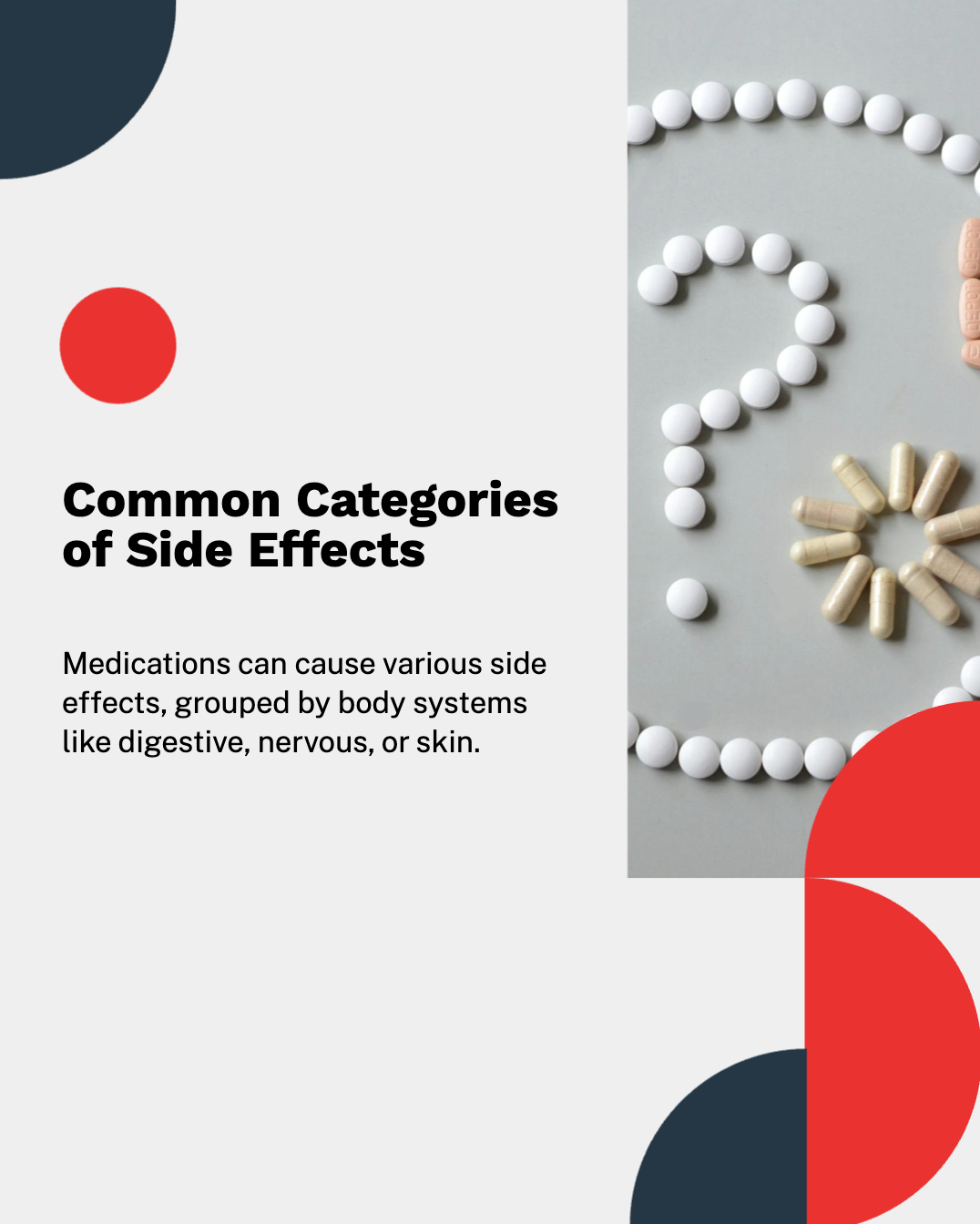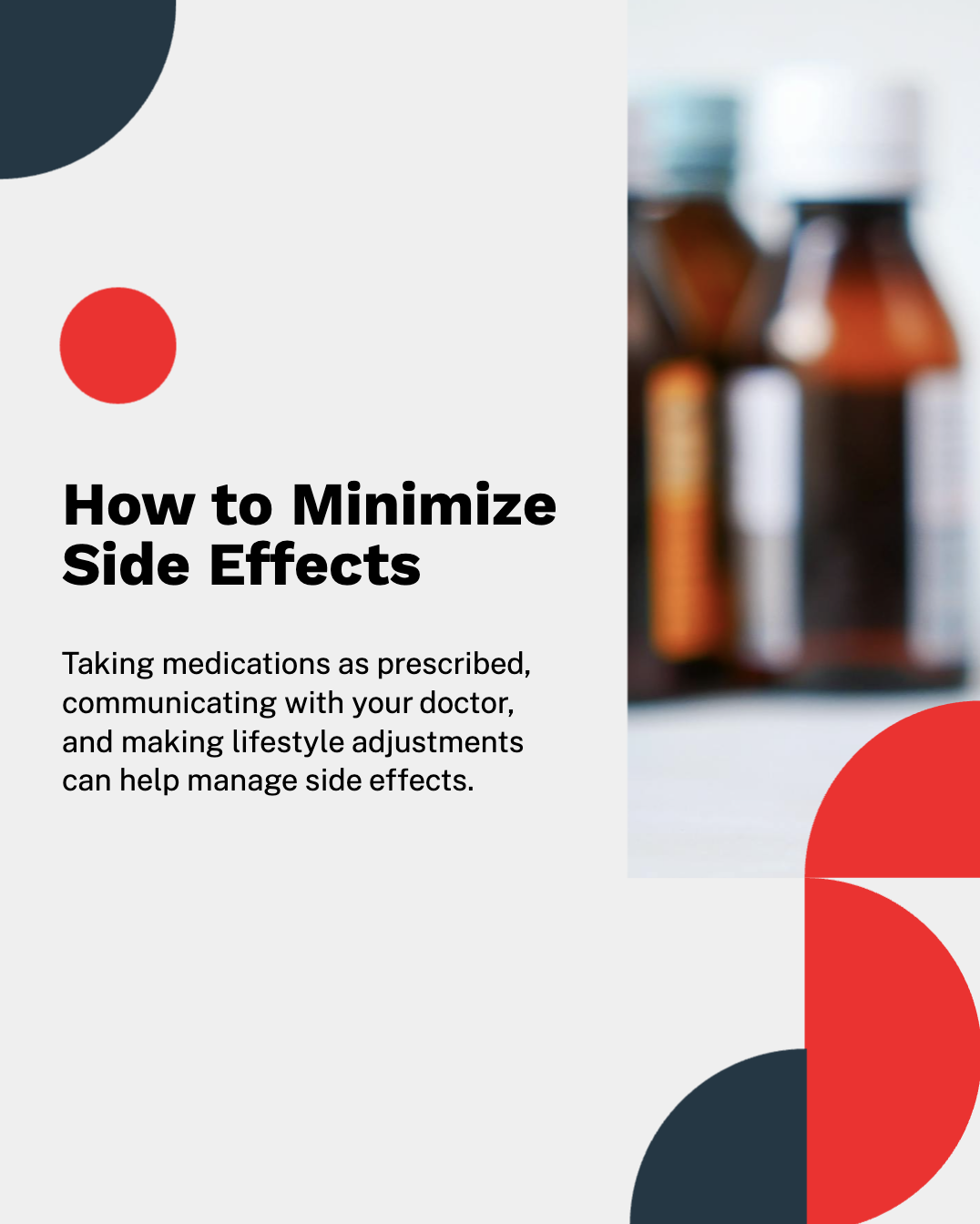THE MOST COMMON SIDE EFFECTS OF PRESCRIPTION MEDICATIONS
HOME
BLOG
THE MOST COMMON SIDE EFFECTS OF PRESCRIPTION MEDICATIONS
Prescription medications are a cornerstone of modern healthcare, helping millions of individuals manage conditions and improve their quality of life. However, these medications often come with potential side effects that vary in severity and frequency. Understanding these side effects can empower patients to make informed decisions and work effectively with healthcare providers.

WHAT ARE PRESCRIPTION MEDICATION SIDE EFFECTS?
Side effects refer to unintended reactions that occur when taking a medication. While many side effects are mild, others can be more severe or require medical attention. These effects can vary depending on the drug, dosage, and individual factors such as age, health status, and other medications taken.

COMMON CATEGORIES OF SIDE EFFECTS
Gastrointestinal Issues
Gastrointestinal problems are among the most frequently reported side effects. These may include:
- Nausea and Vomiting: Often caused by antibiotics, chemotherapy drugs, or painkillers.
- Diarrhea: Common with antibiotics that disrupt gut flora.
- Constipation: Frequently associated with opioid painkillers and some antidepressants.
Neurological and Psychological Effects
Medications can influence the brain and nervous system, leading to:
- Drowsiness or Fatigue: Common with antihistamines and sedatives.
- Dizziness: Frequently reported with blood pressure medications.
- Mood Changes: Antidepressants and corticosteroids may cause mood swings, anxiety, or depression.
Rashes and Allergic Reactions
Skin reactions may range from mild irritation to severe allergic responses like:
- Hives: Often triggered by antibiotics or NSAIDs.
- Photosensitivity: Increased sensitivity to sunlight caused by certain antibiotics and diuretics.
- Dry Skin or Itching: Medications like statins or diuretics may lead to dry or itchy skin.
Cardiovascular Side Effects
- Hypertension: Caused by steroids or birth control pills.
- Hypotension: Common with diuretics or antihypertensive drugs.
- Heart Palpitations: Stimulants, such as those used for ADHD, can cause irregular heartbeats or palpitations.
Hormonal and Metabolic Effects
- Weight Gain: Common with antipsychotics and corticosteroids.
- Weight Loss: Often linked to stimulant medications or thyroid treatments.
- Hyperglycemia: Caused by corticosteroids or antipsychotics.
- Hypoglycemia: Linked to insulin or oral diabetes medications.
Respiratory Effects
- Breathing Difficulties: Medications like beta-blockers or opioids can cause shortness of breath or wheezing in sensitive individuals.
- Cough: ACE inhibitors, commonly used for hypertension, often lead to a persistent dry cough.
Rare but Serious Side Effects
- Liver Damage: Associated with high doses of acetaminophen or statins.
- Kidney Issues: Common with NSAIDs or certain antibiotics.
- Blood Disorders: Rarely, medications may impact blood cell counts, causing anemia or clotting issues.

HOW TO MINIMIZE SIDE EFFECTS
- Follow Prescriptions Closely: Taking medications exactly as prescribed reduces the likelihood of side effects.
- Communicate with Your Doctor: Report any unusual symptoms immediately to your healthcare provider.
- Lifestyle Adjustments: Dietary changes, hydration, and avoiding certain substances (like alcohol) may help mitigate side effects.
WHEN TO SEEK MEDICAL ATTENTION
Certain side effects require immediate attention, including:
- Severe Allergic Reactions: Symptoms like swelling, difficulty breathing, or hives.
- Chest Pain or Severe Dizziness: This could indicate a serious cardiovascular issue.
- Unexplained Bleeding or Bruising: May point to blood disorders.
FAQs
- Can I stop taking a medication if I experience side effects?
Always consult your doctor before discontinuing any medication. Stopping suddenly may worsen your condition or cause withdrawal symptoms.
- Are natural remedies safer than prescription drugs?
While natural remedies may have fewer side effects, they are not always safer or more effective. Consult your healthcare provider for guidance.
- How are side effects reported to authorities?
Patients and healthcare providers can report side effects to regulatory bodies like the FDA through online portals or hotlines.
- Can lifestyle changes reduce the need for medications?
In some cases, adopting a healthier lifestyle may reduce reliance on certain medications. However, this depends on the individual and their medical condition.
- Are generic medications more likely to cause side effects?
Generic medications contain the same active ingredients as brand-name drugs, so side effects are typically similar. Differences may arise due to inactive ingredients.
Prescription medications play a crucial role in managing health conditions, but side effects are a reality that patients must navigate. By staying informed, following prescriptions, and maintaining open communication with healthcare providers, patients can effectively manage and minimize these effects. Always seek professional medical advice for any concerns, ensuring your treatment plan remains safe and effective.
 19.12.2024
19.12.2024



 19.12.2024
19.12.2024